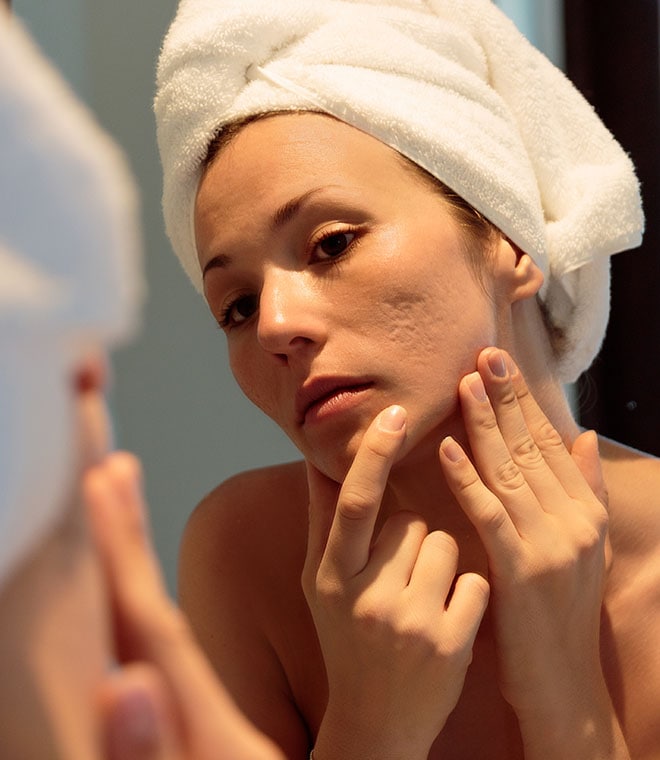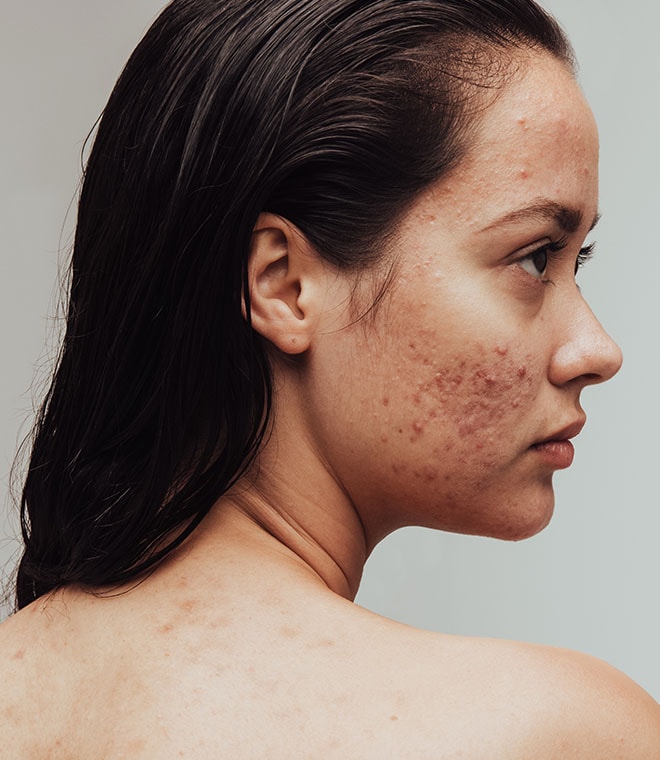Health
What is stress acne?
By Anna H. Chacon, MD, Fellow of the American Academy of Dermatology Jul 10, 2024 • 2 min
Does stress cause acne?
The term "stress acne" is commonly used to describe acne that flares up during a stressful period. This is because stress can be a contributing factor to developing acne. When you are stressed, your body produces more hormones called androgens, which in turn stimulate your oil glands and hair follicles, possibly leading to acne. Stress isn’t the direct cause of acne but it does play a role.
How does stress affect acne?
Studies have shown that although stress doesn't directly cause acne, it's associated with an increase in the severity of acne. Chronic (long-term) stress increases the production of certain hormones that may affect acne in a variety of ways. These hormones include:
- Adrenal androgens: In adult women with acne, stress can lead to an increase in the production of these hormones, which can cause the sebaceous glands in the pores to become enlarged and produce excess sebum, the natural oils in your skin. This increased oil production may cause more severe clogging of the pores, which worsens the acne.
- Corticotropin-releasing hormone: Known as CRH, this hormone is released in response to emotional stress, and it stimulates the production of sebum. CRH also contains proteins that contribute to inflammation.
We still don’t know for sure how stress contributes to acne but there are many possible factors. When we are stressed, we can have more inflammation in our bodies as a response. This inflammation can worsen acne. In addition, people who are stressed may neglect their health in certain ways, including poor sleeping and eating habits, not exercising, and skipping their usual skin care routine.
How can you reduce your stress levels?
If you break out from stress or your acne gets worse during stressful times, you may be able to reduce the severity and frequency of flare-ups by lowering your stress levels. There are a number of ways to manage stress and help keep stress acne under control. Talk to your healthcare provider if stress is affecting your daily life and well-being.
Although stress doesn't cause breakouts in people who don't have acne, it can increase the severity of acne or cause flare-ups. Hormones released during stress can affect the production of sebum and make acne worse. If you often break out from stress, or your lesions become more severe when you're stressed, take time to focus on reducing the stressors in your life and learn how to effectively manage your stress. This can help keep stress hormone levels stable, so your skin is less likely to be affected.
Clinically reviewed and updated by Julie McDaniel, MSN, RN, CRNI, July 2024.
Sources:
- https://medlineplus.gov/acne.html
- https://www.womenshealth.gov/a-z-topics/acne
- https://doi.org/10.3390/cells10061439
- https://journals.asm.org/doi/10.1128/JCM.02723-15
- https://pubmed.ncbi.nlm.nih.gov/28077337/
- https://adaa.org/tips
- https://www.aad.org/public/diseases/acne/really-acne/adult-acne
- https://www.aad.org/public/diseases/acne/causes/acne-causes
- https://www.uptodate.com/contents/pathogenesis-clinical-manifestations-and-diagnosis-of-acne-vulgaris
- https://accesspharmacy.mhmedical.com/content.aspx?bookid=2577§ionid=231922868
- https://www.ncbi.nlm.nih.gov/pmc/articles/PMC3780801/
- https://www.niams.nih.gov/health-topics/acne
- https://share.upmc.com/2018/07/does-stress-cause-acne/
- https://www.aad.org/public/diseases/acne/causes/diet
- https://www.ncbi.nlm.nih.gov/pmc/articles/PMC5300732/




